The Cambridge History of Japan, Vol. 4: Early Modern Japan
Подождите немного. Документ загружается.

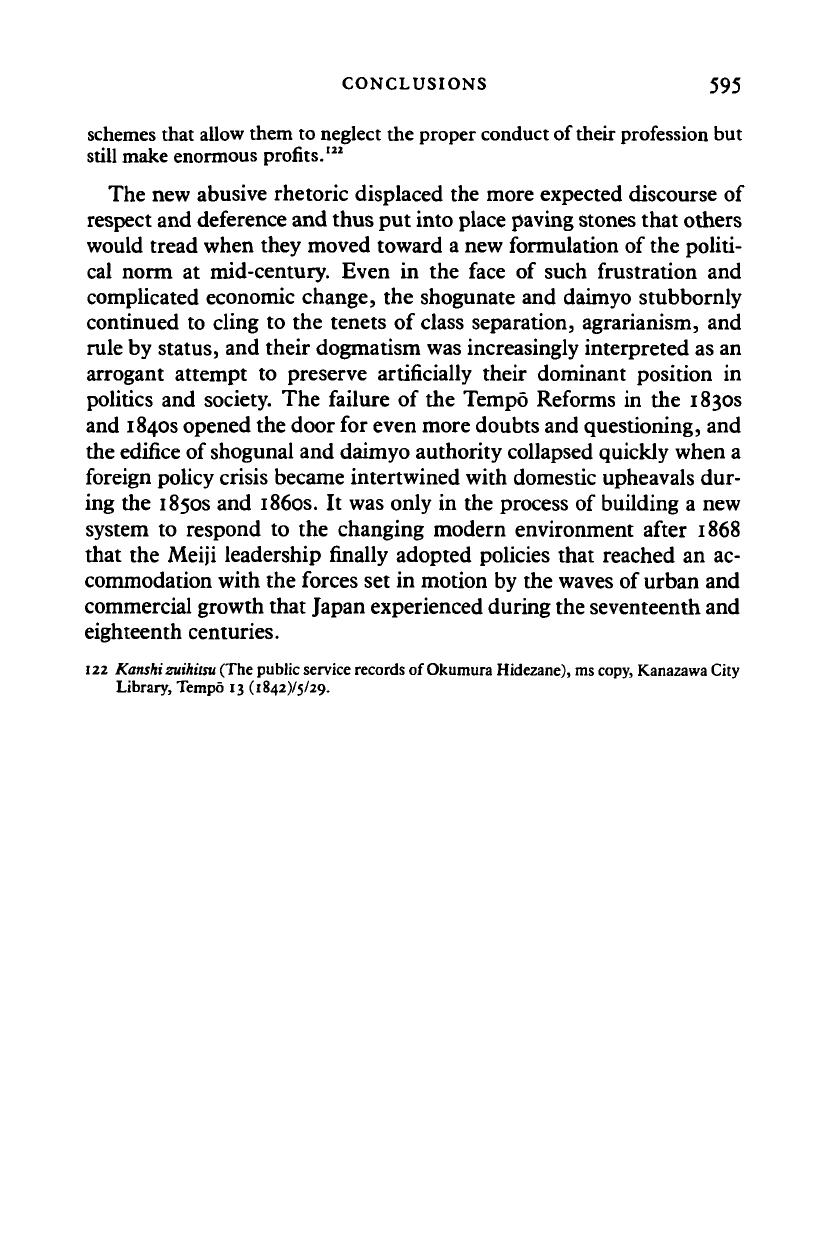
CONCLUSIONS 595
schemes that allow them to neglect the proper conduct of their profession but
still make enormous profits.'
22
The new abusive rhetoric displaced the more expected discourse of
respect and deference and thus put into place paving stones that others
would tread when they moved toward a new formulation of the politi-
cal norm at mid-century. Even in the face of such frustration and
complicated economic change, the shogunate and daimyo stubbornly
continued to cling to the tenets of class separation, agrarianism, and
rule by status, and their dogmatism was increasingly interpreted as an
arrogant attempt to preserve artificially their dominant position in
politics and society. The failure of the Tempo Reforms in the 1830s
and 1840s opened the door for even more doubts and questioning, and
the edifice of shogunal and daimyo authority collapsed quickly when a
foreign policy crisis became intertwined with domestic upheavals dur-
ing the 1850s and 1860s. It was only in the process of building a new
system to respond to the changing modern environment after 1868
that the Meiji leadership finally adopted policies that reached an ac-
commodation with the forces set in motion by the waves of urban and
commercial growth that Japan experienced during the seventeenth and
eighteenth centuries.
122 Kanshi
zuihitsu
(The public service records of Okumura Hidezane), ms copy, Kanazawa City
Library, Tempo 13 (1842)75/29.
Cambridge Histories Online © Cambridge University Press, 2008
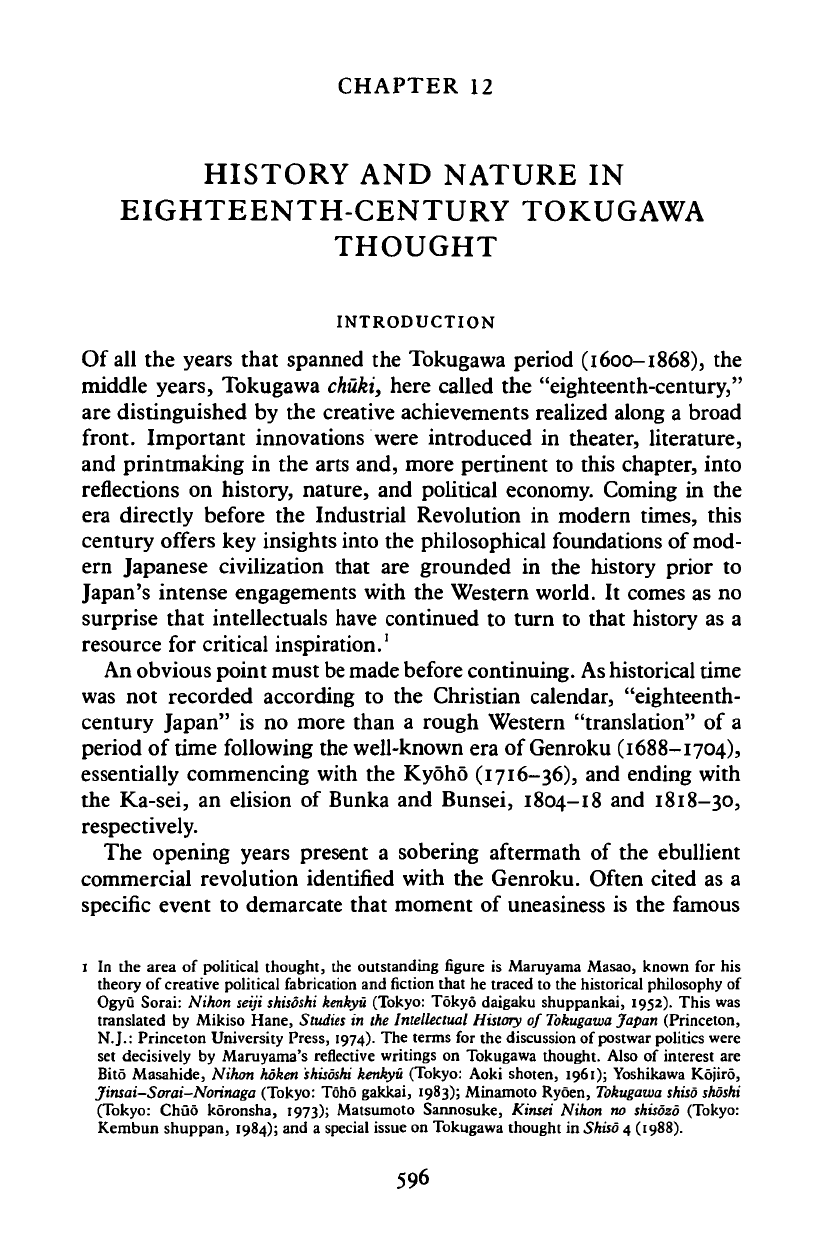
CHAPTER 12
HISTORY AND NATURE IN
EIGHTEENTH-CENTURY TOKUGAWA
THOUGHT
INTRODUCTION
Of all the years that spanned the Tokugawa period (1600-1868), the
middle years, Tokugawa
chuki,
here called the "eighteenth-century,"
are distinguished by the creative achievements realized along a broad
front. Important innovations were introduced in theater, literature,
and printmaking in the arts and, more pertinent to this chapter, into
reflections on history, nature, and political economy. Coming in the
era directly before the Industrial Revolution in modern times, this
century offers key insights into the philosophical foundations of mod-
ern Japanese civilization that are grounded in the history prior to
Japan's intense engagements with the Western world. It comes as no
surprise that intellectuals have continued to turn to that history as a
resource for critical inspiration.
1
An obvious point must
be
made before continuing.
As
historical time
was not recorded according to the Christian calendar, "eighteenth-
century Japan" is no more than a rough Western "translation" of a
period of time following the well-known era of Genroku (1688-1704),
essentially commencing with the Kyoho (1716-36), and ending with
the Ka-sei, an elision of Bunka and Bunsei, 1804-18 and 1818-30,
respectively.
The opening years present a sobering aftermath of the ebullient
commercial revolution identified with the Genroku. Often cited as a
specific event to demarcate that moment of uneasiness is the famous
1 In the area of political thought, the outstanding figure is Maruyama Masao, known for his
theory of creative political fabrication and fiction that he traced to the historical philosophy of
Ogyu Sorai: Nihon seiji
shisoshi kenkyu
(Tokyo: Tokyo daigaku shuppankai, 1952). This was
translated by Mikiso Hane, Studies in the Intellectual History of
Tokugawa
Japan (Princeton,
N.J.: Princeton University Press, 1974). The terms for the discussion of postwar politics were
set decisively by Maruyama's reflective writings on Tokugawa thought. Also of interest are
Bito Masahide, Nihon hoken
shisoshi
kenkyu (Tokyo: Aoki shoten, 1961); Yoshikawa Kojiro,
Jinsai-Sorai-Norinaga (Tokyo: Toho gakkai, 1983); Minamoto Ryoen,
Tokugawa shiso shoshi
(Tokyo: Chuo koronsha, 1973); Matsumoto Sannosuke, Kinsei Nihon no shisozo (Tokyo:
Kembun shuppan, 1984); and a special issue on Tokugawa thought in Shiso 4 (1988).
596
Cambridge Histories Online © Cambridge University Press, 2008
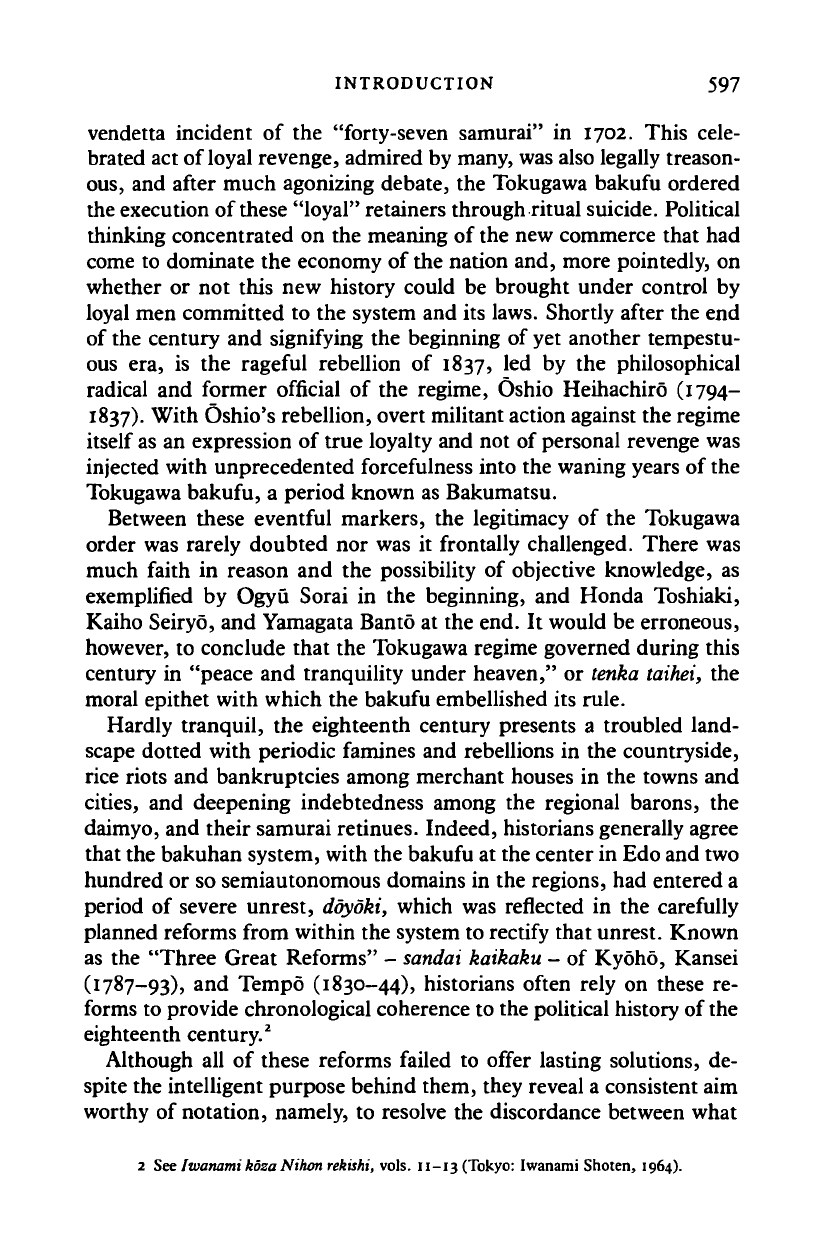
INTRODUCTION 597
vendetta incident of the "forty-seven samurai" in 1702. This cele-
brated act of
loyal
revenge, admired by many, was also legally treason-
ous,
and after much agonizing debate, the Tokugawa bakufu ordered
the execution of these "loyal" retainers through ritual suicide. Political
thinking concentrated on the meaning of the new commerce that had
come to dominate the economy of the nation and, more pointedly, on
whether or not this new history could be brought under control by
loyal men committed to the system and its laws. Shortly after the end
of the century and signifying the beginning of yet another tempestu-
ous era, is the rageful rebellion of 1837, led by the philosophical
radical and former official of the regime, Oshio Heihachiro (1794-
1837).
With Oshio's rebellion, overt militant action against the regime
itself as an expression of true loyalty and not of personal revenge was
injected with unprecedented forcefulness into the waning years of the
Tokugawa bakufu, a period known as Bakumatsu.
Between these eventful markers, the legitimacy of the Tokugawa
order was rarely doubted nor was it frontally challenged. There was
much faith in reason and the possibility of objective knowledge, as
exemplified by Ogyu Sorai in the beginning, and Honda Toshiaki,
Kaiho Seiryo, and Yamagata Banto at the end. It would be erroneous,
however, to conclude that the Tokugawa regime governed during this
century in "peace and tranquility under heaven," or
tenka
taihei,
the
moral epithet with which the bakufu embellished its rule.
Hardly tranquil, the eighteenth century presents a troubled land-
scape dotted with periodic famines and rebellions in the countryside,
rice riots and bankruptcies among merchant houses in the towns and
cities,
and deepening indebtedness among the regional barons, the
daimyo, and their samurai retinues. Indeed, historians generally agree
that the bakuhan system, with the bakufu at the center in Edo and two
hundred or so semiautonomous domains in the regions, had entered a
period of severe unrest, doyoki, which was reflected in the carefully
planned reforms from within the system to rectify that unrest. Known
as the "Three Great Reforms" -
sandai
kaikaku - of Kyoho, Kansei
(1787-93), and Tempo (1830-44), historians often rely on these re-
forms to provide chronological coherence to the political history of the
eighteenth century.
2
Although all of these reforms failed to offer lasting solutions, de-
spite the intelligent purpose behind them, they reveal a consistent aim
worthy of notation, namely, to resolve the discordance between what
2 See Iwanami koza Nihon
rekishi,
vols. 11-13 (Tokyo: Iwanami Shoten, 1964).
Cambridge Histories Online © Cambridge University Press, 2008
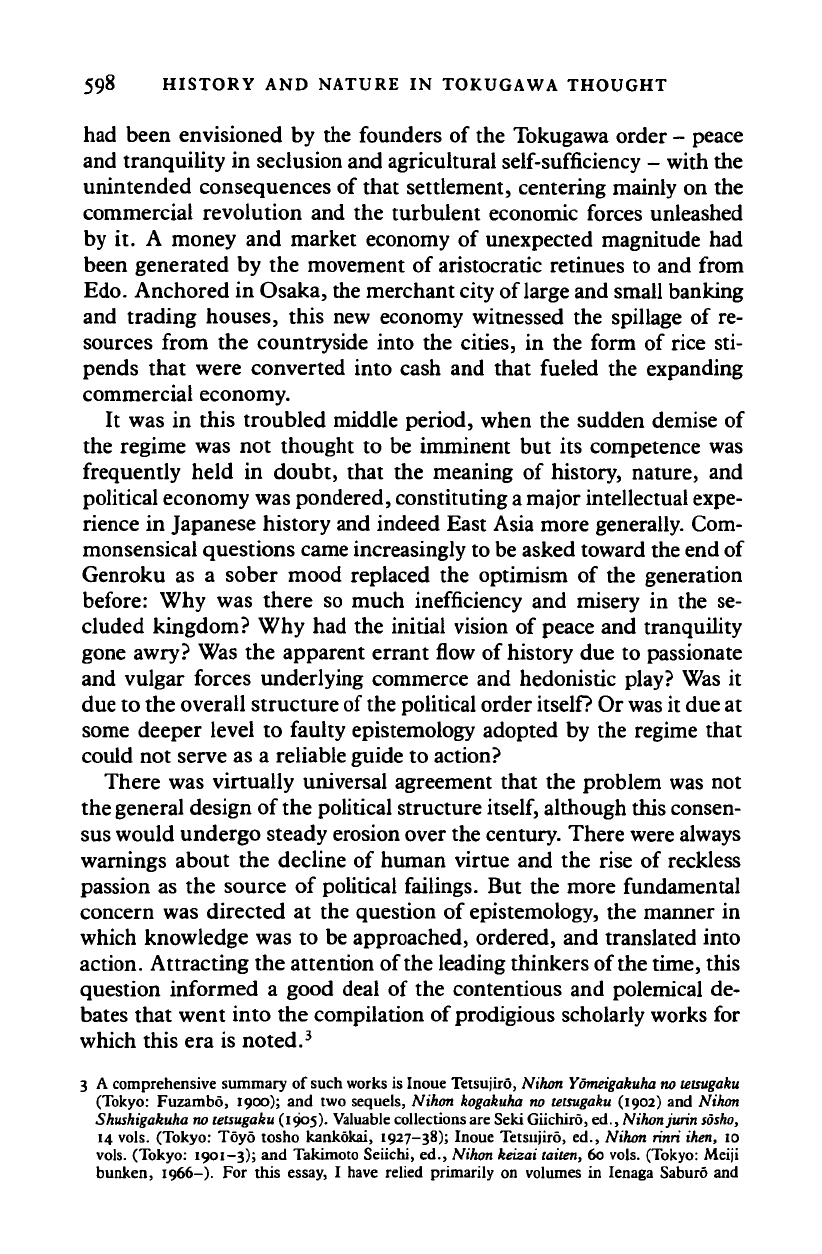
598 HISTORY AND NATURE IN TOKUGAWA THOUGHT
had been envisioned by the founders of the Tokugawa order - peace
and tranquility in seclusion and agricultural self-sufficiency - with the
unintended consequences of that settlement, centering mainly on the
commercial revolution and the turbulent economic forces unleashed
by it. A money and market economy of unexpected magnitude had
been generated by the movement of aristocratic retinues to and from
Edo.
Anchored in Osaka, the merchant city of large and small banking
and trading houses, this new economy witnessed the spillage of re-
sources from the countryside into the cities, in the form of rice sti-
pends that were converted into cash and that fueled the expanding
commercial economy.
It was in this troubled middle period, when the sudden demise of
the regime was not thought to be imminent but its competence was
frequently held in doubt, that the meaning of history, nature, and
political economy was pondered, constituting
a
major intellectual expe-
rience in Japanese history and indeed East Asia more generally. Com-
monsensical questions came increasingly to be asked toward the end of
Genroku as a sober mood replaced the optimism of the generation
before: Why was there so much inefficiency and misery in the se-
cluded kingdom? Why had the initial vision of peace and tranquility
gone awry? Was the apparent errant flow of history due to passionate
and vulgar forces underlying commerce and hedonistic play? Was it
due to the overall structure of the political order itself? Or was it due at
some deeper level to faulty epistemology adopted by the regime that
could not serve as a reliable guide to action?
There was virtually universal agreement that the problem was not
the general design of the political structure
itself,
although this consen-
sus would undergo steady erosion over the century. There were always
warnings about the decline of human virtue and the rise of reckless
passion as the source of political failings. But the more fundamental
concern was directed at the question of epistemology, the manner in
which knowledge was to be approached, ordered, and translated into
action. Attracting the attention of the leading thinkers of the time, this
question informed a good deal of the contentious and polemical de-
bates that went into the compilation of prodigious scholarly works for
which this era is noted.
3
3 A comprehensive summary of such works is Inoue Tetsujiro, Nihon
Yomeigakuha
no
teisugaku
(Tokyo: Fuzambo, 1900); and two sequels, Nihon kogakuha no leisugaku (1902) and Nihon
Shushigakuha no letsugaku (1905). Valuable collections are Seki Giichiro, ed., Nihon jurin
sosho,
14 vols. (Tokyo: Toyo tosho kankokai, 1927-38); Inoue Tetsujiro, ed., Nihon rinri then, 10
vols.
(Tokyo: 1901-3); and Takimoto Seiichi, ed., Nihon keizai taiten, 60 vols. (Tokyo: Meiji
bunken, 1966-). For this essay, I have relied primarily on volumes in Ienaga Saburo and
Cambridge Histories Online © Cambridge University Press, 2008
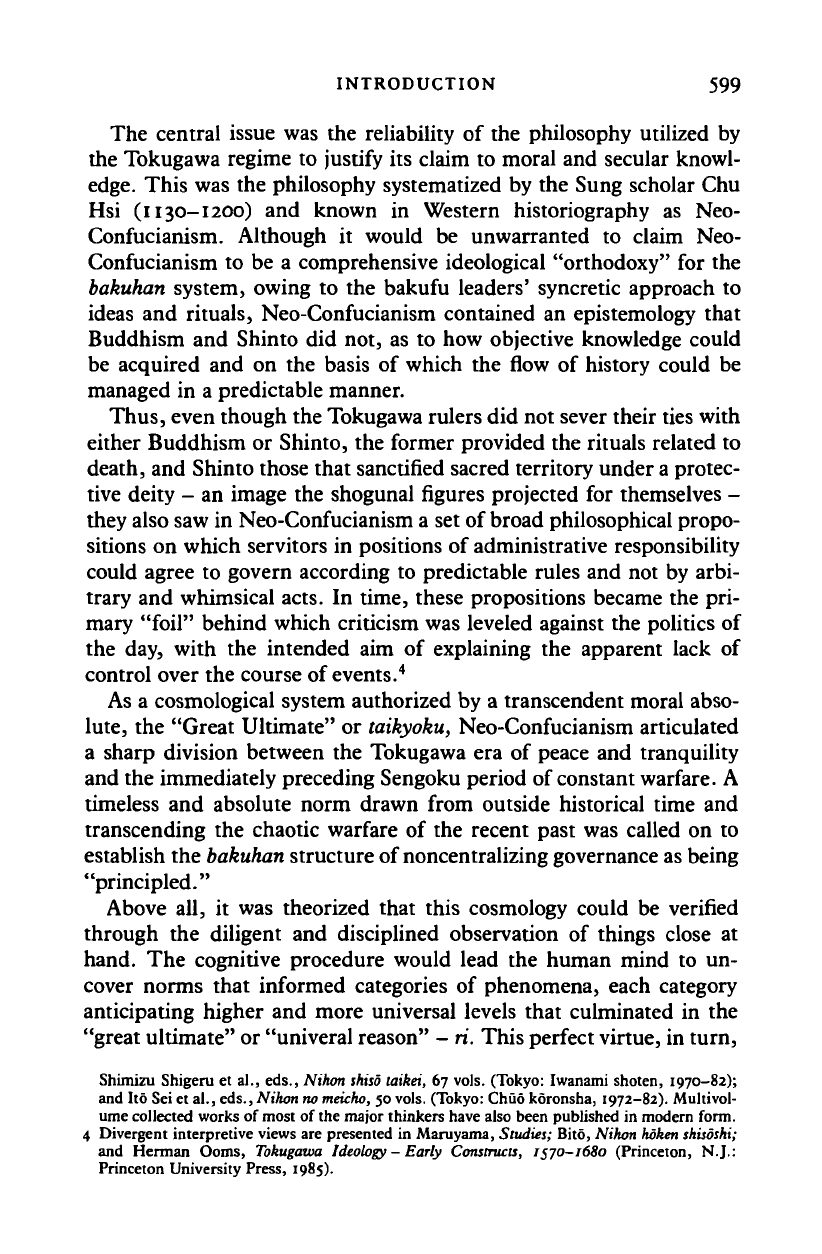
INTRODUCTION 599
The central issue was the reliability of the philosophy utilized by
the Tokugawa regime to justify its claim to moral and secular knowl-
edge. This was the philosophy systematized by the Sung scholar Chu
Hsi (i 130-1200) and known in Western historiography as Neo-
Confucianism. Although it would be unwarranted to claim Neo-
Confucianism to be a comprehensive ideological "orthodoxy" for the
bakuhan system, owing to the bakufu leaders' syncretic approach to
ideas and rituals, Neo-Confucianism contained an epistemology that
Buddhism and Shinto did not, as to how objective knowledge could
be acquired and on the basis of which the flow of history could be
managed in a predictable manner.
Thus, even though the Tokugawa rulers did not sever their ties with
either Buddhism or Shinto, the former provided the rituals related to
death, and Shinto those that sanctified sacred territory under a protec-
tive deity - an image the shogunal figures projected for themselves -
they also saw in Neo-Confucianism a set of broad philosophical propo-
sitions on which servitors in positions of administrative responsibility
could agree to govern according to predictable rules and not by arbi-
trary and whimsical acts. In time, these propositions became the pri-
mary "foil" behind which criticism was leveled against the politics of
the day, with the intended aim of explaining the apparent lack of
control over the course of events.
4
As a cosmological system authorized by a transcendent moral abso-
lute,
the "Great Ultimate" or taikyoku, Neo-Confucianism articulated
a sharp division between the Tokugawa era of peace and tranquility
and the immediately preceding Sengoku period of constant warfare. A
timeless and absolute norm drawn from outside historical time and
transcending the chaotic warfare of the recent past was called on to
establish the bakuhan structure of noncentralizing governance as being
"principled."
Above all, it was theorized that this cosmology could be verified
through the diligent and disciplined observation of things close at
hand. The cognitive procedure would lead the human mind to un-
cover norms that informed categories of phenomena, each category
anticipating higher and more universal levels that culminated in the
"great ultimate" or "univeral reason" - ri. This perfect virtue, in turn,
Shimizu Shigem
et al., eds.,
Nihon shiso
taikei,
67
vols.
(Tokyo:
Iwanami
shoten,
1970-82);
and
ltd Sei et al.,
eds.,
Nihon no
macho,
50
vols.
(Tokyo:
Chud
koronsha,
1972-82).
Multivol-
ume collected works
of
most
of
the major thinkers have also been published
in
modern
form.
4 Divergent interpretive views
are
presented
in
Maruyama,
Studies;
Bito,
Nihon hoken
shisdshi;
and Herman
Ooms,
Tokugawa Ideology
-
Early
Constructs,
1$70-1680
(Princeton,
N.J.:
Princeton University
Press,
1985).
Cambridge Histories Online © Cambridge University Press, 2008
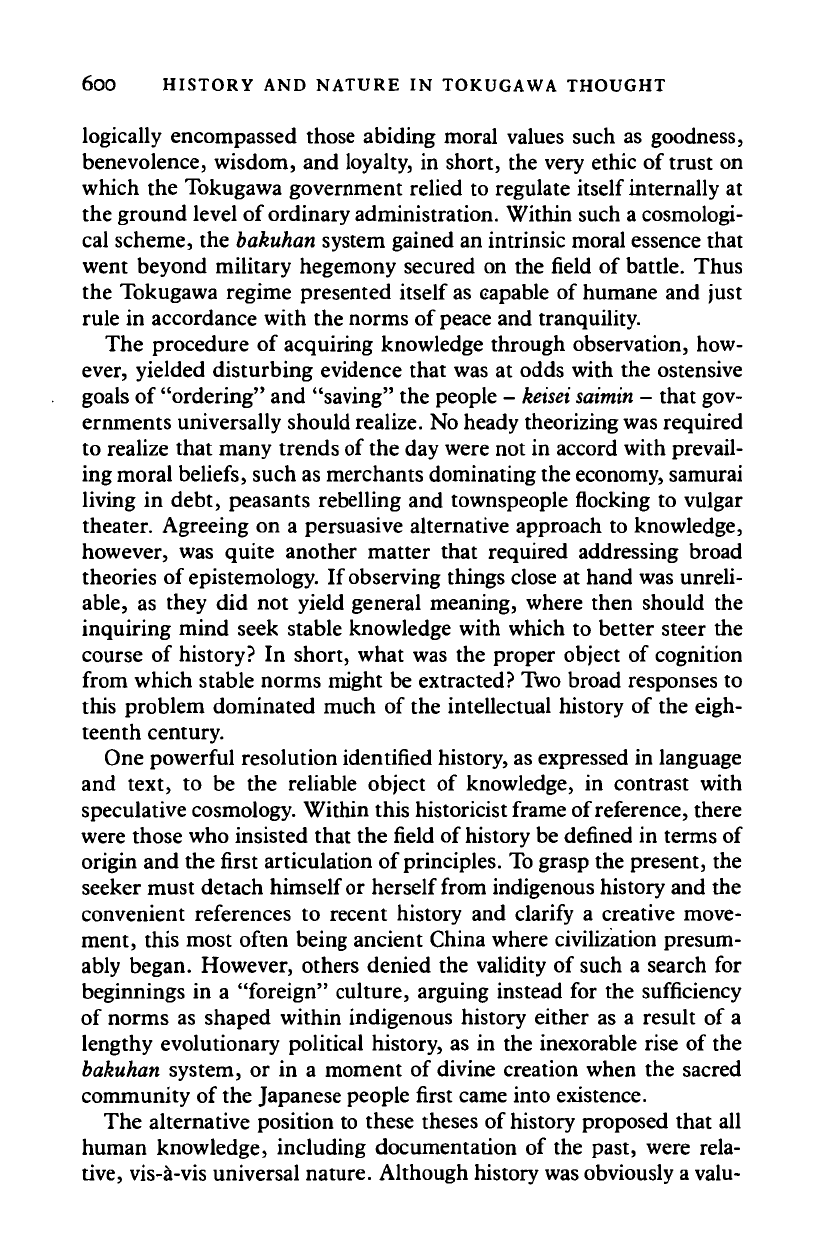
600 HISTORY AND NATURE IN TOKUGAWA THOUGHT
logically encompassed those abiding moral values such as goodness,
benevolence, wisdom, and loyalty, in short, the very ethic of trust on
which the Tokugawa government relied to regulate itself internally at
the ground level of ordinary administration. Within such a cosmologi-
cal scheme, the bakuhan system gained an intrinsic moral essence that
went beyond military hegemony secured on the field of battle. Thus
the Tokugawa regime presented itself as capable of humane and just
rule in accordance with the norms of
peace
and tranquility.
The procedure of acquiring knowledge through observation, how-
ever, yielded disturbing evidence that was at odds with the ostensive
goals of "ordering" and "saving" the people -
keisei saitnin
- that gov-
ernments universally should realize. No heady theorizing was required
to realize that many trends of the day were not in accord with prevail-
ing moral beliefs, such as merchants dominating the economy, samurai
living in debt, peasants rebelling and townspeople flocking to vulgar
theater. Agreeing on a persuasive alternative approach to knowledge,
however, was quite another matter that required addressing broad
theories of epistemology. If observing things close at hand was unreli-
able,
as they did not yield general meaning, where then should the
inquiring mind seek stable knowledge with which to better steer the
course of history? In short, what was the proper object of cognition
from which stable norms might be extracted? Two broad responses to
this problem dominated much of the intellectual history of the eigh-
teenth century.
One powerful resolution identified history, as expressed in language
and text, to be the reliable object of knowledge, in contrast with
speculative cosmology. Within this historicist frame of reference, there
were those who insisted that the field of history be defined in terms of
origin and the first articulation of
principles.
To grasp the present, the
seeker must detach himself or herself from indigenous history and the
convenient references to recent history and clarify a creative move-
ment, this most often being ancient China where civilization presum-
ably began. However, others denied the validity of such a search for
beginnings in a "foreign" culture, arguing instead for the sufficiency
of norms as shaped within indigenous history either as a result of a
lengthy evolutionary political history, as in the inexorable rise of the
bakuhan system, or in a moment of divine creation when the sacred
community of the Japanese people first came into existence.
The alternative position to these theses of history proposed that all
human knowledge, including documentation of the past, were rela-
tive,
vis-a-vis universal nature. Although history was obviously a valu-
Cambridge Histories Online © Cambridge University Press, 2008
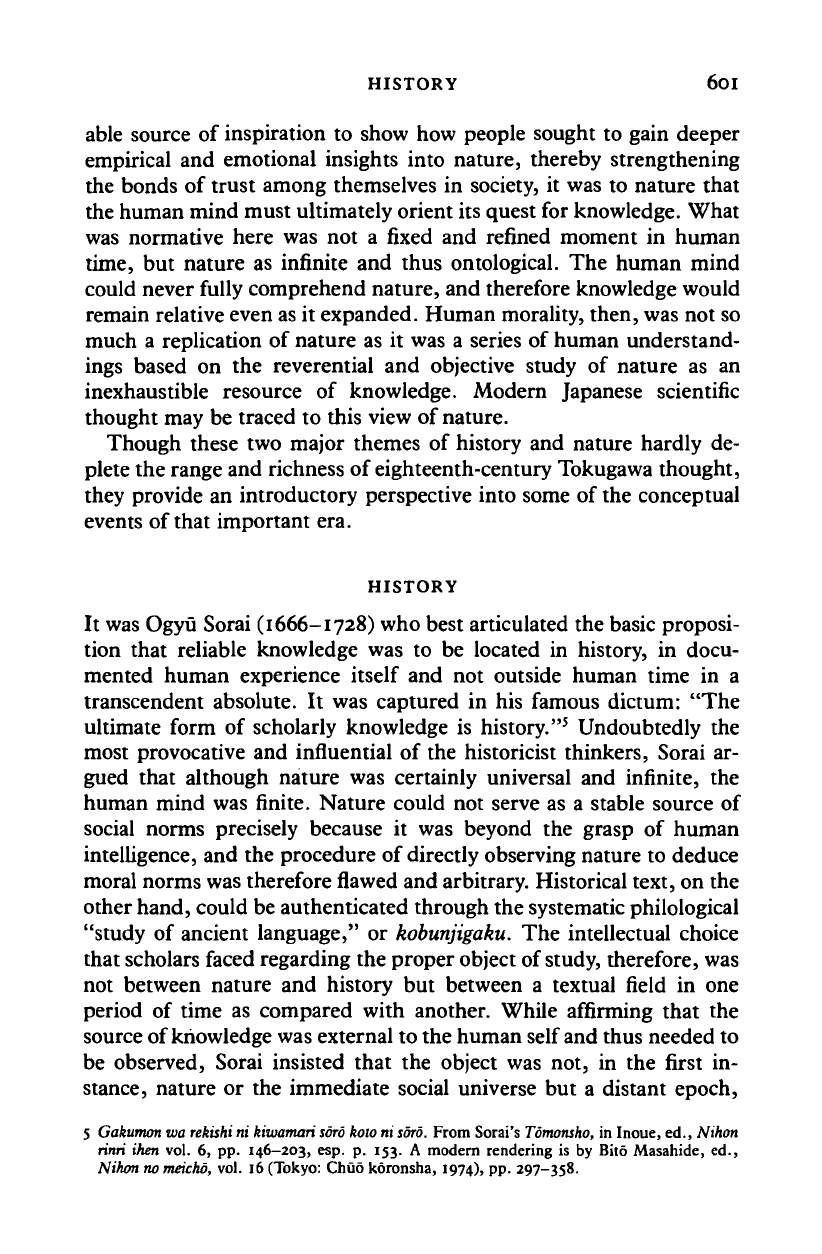
HISTORY 601
able source of inspiration to show how people sought to gain deeper
empirical and emotional insights into nature, thereby strengthening
the bonds of trust among themselves in society, it was to nature that
the human mind must ultimately orient its quest for knowledge. What
was normative here was not a fixed and refined moment in human
time,
but nature as infinite and thus ontological. The human mind
could never fully comprehend nature, and therefore knowledge would
remain relative even as it expanded. Human morality, then, was not so
much a replication of nature as it was a series of human understand-
ings based on the reverential and objective study of nature as an
inexhaustible resource of knowledge. Modern Japanese scientific
thought may be traced to this view of nature.
Though these two major themes of history and nature hardly de-
plete the range and richness of eighteenth-century Tokugawa thought,
they provide an introductory perspective into some of the conceptual
events of that important era.
HISTORY
It was Ogyu Sorai (1666-1728) who best articulated the basic proposi-
tion that reliable knowledge was to be located in history, in docu-
mented human experience itself and not outside human time in a
transcendent absolute. It was captured in his famous dictum: "The
ultimate form of scholarly knowledge is history."
5
Undoubtedly the
most provocative and influential of the historicist thinkers, Sorai ar-
gued that although nature was certainly universal and infinite, the
human mind was finite. Nature could not serve as a stable source of
social norms precisely because it was beyond the grasp of human
intelligence, and the procedure of directly observing nature to deduce
moral norms was therefore flawed and arbitrary. Historical text, on the
other hand, could be authenticated through the systematic philological
"study of ancient language," or
kobunjigaku.
The intellectual choice
that scholars faced regarding the proper object of
study,
therefore, was
not between nature and history but between a textual field in one
period of time as compared with another. While affirming that the
source of knowledge was external to the human self and thus needed to
be observed, Sorai insisted that the object was not, in the first in-
stance, nature or the immediate social universe but a distant epoch,
5
Gakumon
tua
rekishi
ni kiwamari
soro
koto ni
sord.
From Sorai's
Tomonsho,
in Inoue, ed., Nikon
rinri ihen vol. 6, pp. 146-203, esp. p. 153. A modern rendering is by Bito Masahide, ed.,
Nihon no
meichd,
vol. 16 (Tokyo: Chuo kdronsha, 1974), pp. 297-358.
Cambridge Histories Online © Cambridge University Press, 2008
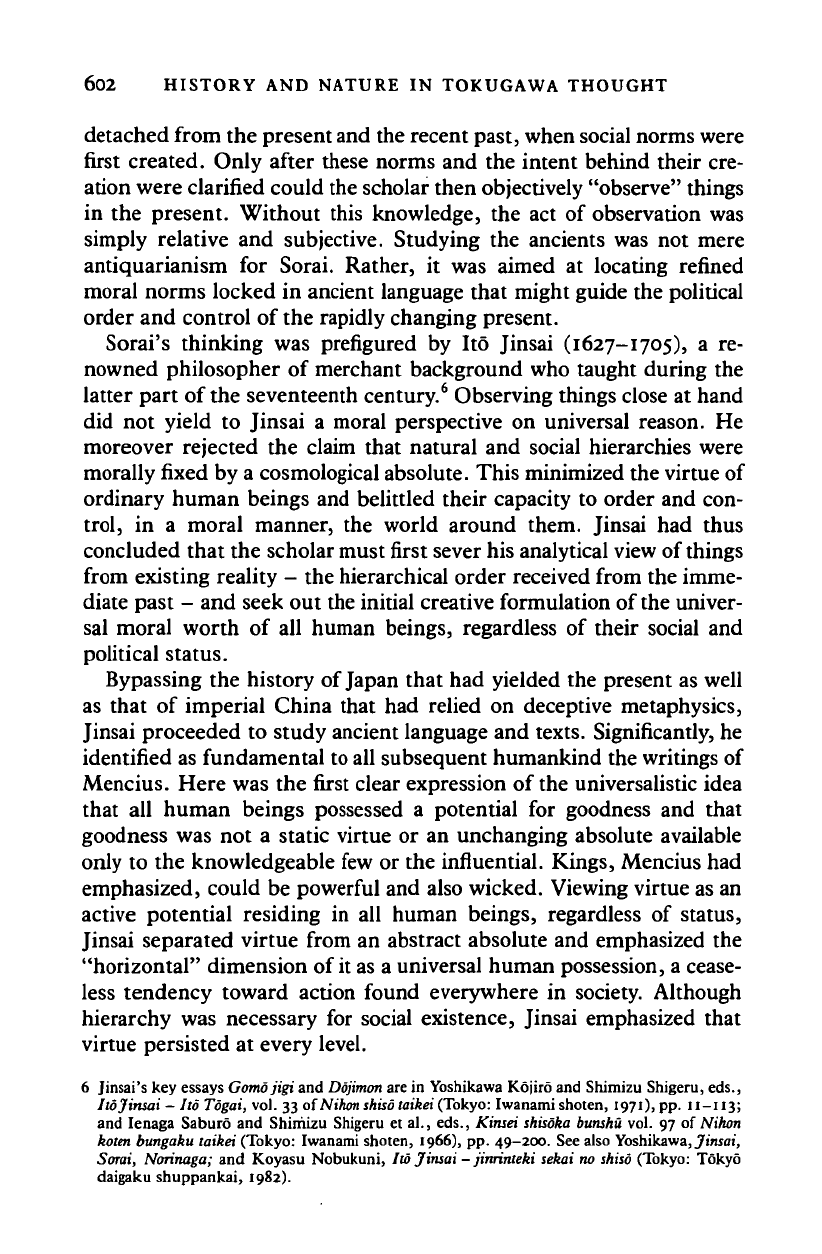
602 HISTORY AND NATURE IN TOKUGAWA THOUGHT
detached from the present and the recent past, when social norms were
first created. Only after these norms and the intent behind their cre-
ation were clarified could the scholar then objectively "observe" things
in the present. Without this knowledge, the act of observation was
simply relative and subjective. Studying the ancients was not mere
antiquarianism for Sorai. Rather, it was aimed at locating refined
moral norms locked in ancient language that might guide the political
order and control of the rapidly changing present.
Sorai's thinking was prefigured by ltd Jinsai (1627-1705), a re-
nowned philosopher of merchant background who taught during the
latter part of the seventeenth century.
6
Observing things close at hand
did not yield to Jinsai a moral perspective on universal reason. He
moreover rejected the claim that natural and social hierarchies were
morally fixed by a cosmological absolute. This minimized the virtue of
ordinary human beings and belittled their capacity to order and con-
trol, in a moral manner, the world around them. Jinsai had thus
concluded that the scholar must first sever his analytical view of things
from existing reality - the hierarchical order received from the imme-
diate past - and seek out the initial creative formulation of the univer-
sal moral worth of all human beings, regardless of their social and
political status.
Bypassing the history of Japan that had yielded the present as well
as that of imperial China that had relied on deceptive metaphysics,
Jinsai proceeded to study ancient language and texts. Significantly, he
identified as fundamental to all subsequent humankind the writings of
Mencius. Here was the first clear expression of the universalistic idea
that all human beings possessed a potential for goodness and that
goodness was not a static virtue or an unchanging absolute available
only to the knowledgeable few or the influential. Kings, Mencius had
emphasized, could be powerful and also wicked. Viewing virtue as an
active potential residing in all human beings, regardless of status,
Jinsai separated virtue from an abstract absolute and emphasized the
"horizontal" dimension of
it
as a universal human possession, a cease-
less tendency toward action found everywhere in society. Although
hierarchy was necessary for social existence, Jinsai emphasized that
virtue persisted at every level.
6 Jinsai's key essays Gomdjigi and
Dojimon
are in Yoshikawa Kojiro and Shimizu Shigeru, eds.,
ltd Jinsai - ltd Tdgai, vol. 33 of
Nihon shiso
laikei
(Tokyo:
Iwanami shoten, 1971), pp. 11-113;
and Ienaga Saburo and Shimizu Shigeru et al., eds., Kinsei shisdka
bunshu
vol. 97 of Nihon
koten bungaku taikei (Tokyo: Iwanami shoten, 1966), pp. 49-200. See also Yoshikawa, Jinsai,
Sorai, Norinaga; and Koyasu Nobukuni, ltd Jinsai - jinrinteki sekai no shiso (Tokyo: Tokyo
daigaku shuppankai, 1982).
Cambridge Histories Online © Cambridge University Press, 2008
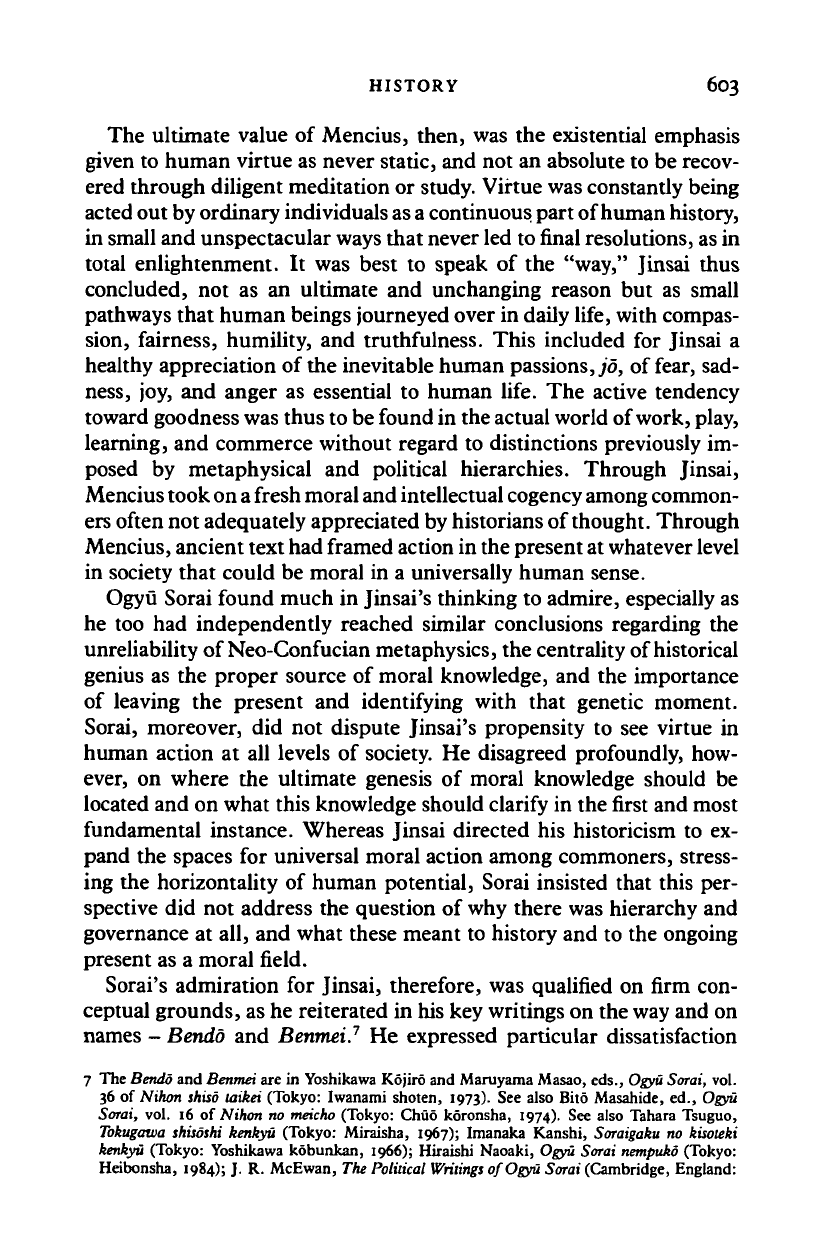
HISTORY 603
The ultimate value of Mencius, then, was the existential emphasis
given to human virtue as never static, and not an absolute to be recov-
ered through diligent meditation or study. Virtue was constantly being
acted out by ordinary individuals
as a
continuous part of human history,
in small and unspectacular ways that never led to final resolutions, as in
total enlightenment. It was best to speak of the "way," Jinsai thus
concluded, not as an ultimate and unchanging reason but as small
pathways that human beings journeyed over in daily life, with compas-
sion, fairness, humility, and truthfulness. This included for Jinsai a
healthy appreciation of the inevitable human
passions,
jo, of fear, sad-
ness,
joy, and anger as essential to human life. The active tendency
toward goodness was thus to be found in the actual world of work, play,
learning, and commerce without regard to distinctions previously im-
posed by metaphysical and political hierarchies. Through Jinsai,
Mencius took
on a
fresh moral and intellectual cogency among common-
ers often not adequately appreciated by historians of thought. Through
Mencius, ancient text had framed action in the present at whatever
level
in society that could be moral in a universally human sense.
Ogyu Sorai found much in Jinsai's thinking to admire, especially as
he too had independently reached similar conclusions regarding the
unreliability of Neo-Confucian metaphysics, the centrality of historical
genius as the proper source of moral knowledge, and the importance
of leaving the present and identifying with that genetic moment.
Sorai, moreover, did not dispute Jinsai's propensity to see virtue in
human action at all levels of society. He disagreed profoundly, how-
ever, on where the ultimate genesis of moral knowledge should be
located and on what this knowledge should clarify in the first and most
fundamental instance. Whereas Jinsai directed his historicism to ex-
pand the spaces for universal moral action among commoners, stress-
ing the horizontality of human potential, Sorai insisted that this per-
spective did not address the question of why there was hierarchy and
governance at all, and what these meant to history and to the ongoing
present as a moral field.
Sorai's admiration for Jinsai, therefore, was qualified on firm con-
ceptual grounds, as he reiterated in his key writings on the way and on
names -
Bendd
and Benmei.
1
He expressed particular dissatisfaction
7 The Bendd and Benmei are in Yoshikawa Kojiro and Maruyama Masao, eds., Ogyu Sorai, vol.
36 of Nihon shiso taikei (Tokyo: Iwanami shoten, 1973). See also Bito Masahide, ed., Ogyu
Sorai, vol. 16 of Nihon no meicho (Tokyo: Chuo koronsha, 1974). See also Tahara Tsuguo,
Tokugawa shisoshi kenkyu (Tokyo: Miraisha, 1967); Imanaka Kanshi, Soraigaku no kisoteki
kenkyu (Tokyo: Yoshikawa kobunkan, 1966); Hixaishi Naoaki, Ogyu Sorai
nempuko
(Tokyo:
Heibonsha, 1984); J. R. McEwan, The Political
Writings
of Ogyu Sorai (Cambridge, England:
Cambridge Histories Online © Cambridge University Press, 2008
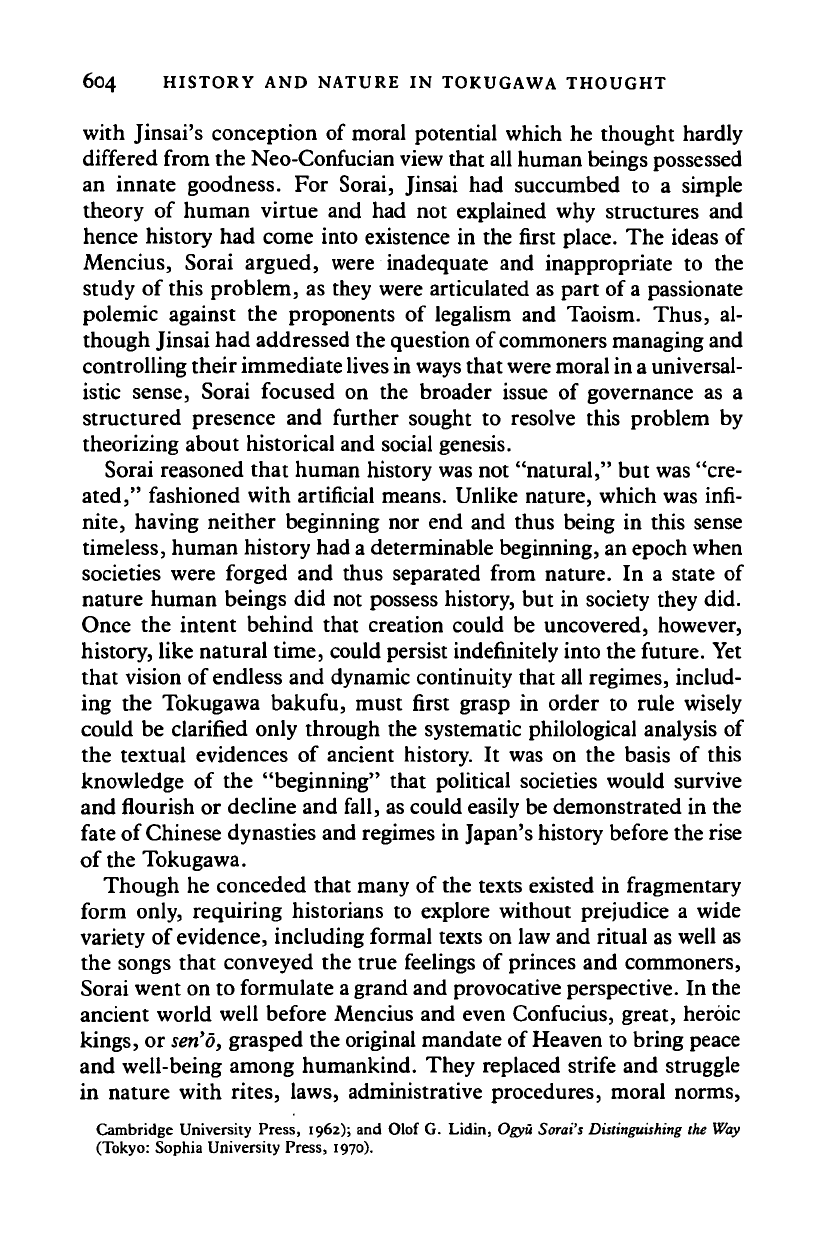
604 HISTORY AND NATURE IN TOKUGAWA THOUGHT
with Jinsai's conception of moral potential which he thought hardly
differed from the Neo-Confucian view that all human beings possessed
an innate goodness. For Sorai, Jinsai had succumbed to a simple
theory of human virtue and had not explained why structures and
hence history had come into existence in the first place. The ideas of
Mencius, Sorai argued, were inadequate and inappropriate to the
study of this problem, as they were articulated as part of
a
passionate
polemic against the proponents of legalism and Taoism. Thus, al-
though Jinsai had addressed the question of commoners managing and
controlling their immediate lives in ways that were moral in
a
universal-
istic sense, Sorai focused on the broader issue of governance as a
structured presence and further sought to resolve this problem by
theorizing about historical and social genesis.
Sorai reasoned that human history was not "natural," but was "cre-
ated," fashioned with artificial means. Unlike nature, which was infi-
nite,
having neither beginning nor end and thus being in this sense
timeless, human history had a determinable beginning, an epoch when
societies were forged and thus separated from nature. In a state of
nature human beings did not possess history, but in society they did.
Once the intent behind that creation could be uncovered, however,
history, like natural time, could persist indefinitely into the future. Yet
that vision of endless and dynamic continuity that all regimes, includ-
ing the Tokugawa bakufu, must first grasp in order to rule wisely
could be clarified only through the systematic philological analysis of
the textual evidences of ancient history. It was on the basis of this
knowledge of the "beginning" that political societies would survive
and flourish or decline and fall, as could easily be demonstrated in the
fate of Chinese dynasties and regimes in Japan's history before the rise
of the Tokugawa.
Though he conceded that many of the texts existed in fragmentary
form only, requiring historians to explore without prejudice a wide
variety of
evidence,
including formal texts on law and ritual as well as
the songs that conveyed the true feelings of princes and commoners,
Sorai went on to formulate
a
grand and provocative perspective. In the
ancient world well before Mencius and even Confucius, great, heroic
kings,
or
sen'3,
grasped the original mandate of Heaven to bring peace
and well-being among humankind. They replaced strife and struggle
in nature with rites, laws, administrative procedures, moral norms,
Cambridge University Press, 1962); and Olof G. Lidin, Ogyu Sorai's Distinguishing the Way
(Tokyo: Sophia University Press, 1970).
Cambridge Histories Online © Cambridge University Press, 2008
